“Almost everything will work again if you unplug it for a few minutes, including you.” American writer Anne Lamott’s quote underscores a truth often overlooked: taking time off from work is essential for long-term sustainability, especially in demanding industries like mortgage lending. Given the tough market lenders and servicers have experienced over the past two years, it’s a message that bears repeating.
Taking time off is something we prioritize at STRATMOR as we realize we’re more than just a consulting and advisory firm. We’re a community of individuals united by a shared commitment to excellence. Earning trust and building long-term relationships with our clients and our employees is key to our culture and our success.
To maintain our reputation as the most trusted consulting firm in the mortgage industry, we prioritize our greatest asset, our people. STRATMOR only recruits exceptional talent who share our dedication to quality. But building a winning team isn’t just about recruiting the best; it’s also about cultivating an environment where everyone feels valued, empowered and inspired.
How can companies effectively create and retain winning teams? It all starts at the top. When our leaders exude energy, passion and a can-do attitude, it’s contagious. Our employees take our lead and intuitively respond accordingly, creating a ripple effect that energizes the entire team. Conversely, stress and negativity can dampen morale and hinder productivity.
Just like Olympic athletes, we need to be mentally and physically sharp to perform at our peak. By investing in our health, we’re not just taking care of ourselves; we’re also ensuring that we can provide the leadership our teams need to succeed.
So, how do Olympic athletes stay at the top of their game?
Let’s start by breaking down Team USA’s successes at the 2024 Paris Olympics.
Team USA truly shined at the 2024 Paris Olympics. Bringing home 126 medals — 40 of which were gold — the team dominated the podium with the most medals won during the 2024 games. Our athletes were at the heart of many spectacular moments. But what sets these athletes apart? STRATMOR delved into their strategies to discover the secrets to their success.
Passion. Becoming an Olympian doesn’t happen overnight. It requires a different level of commitment and a true passion for the sport. This was evident among every athlete on the Olympic stage. From the vast swimming pools to the rugged rugby pitch, it was clear each athlete was dedicated to bringing their very best performance to the world stage.
Focus and Determination. Pro golfer Scottie Scheffler came back from a six-shot deficit to win gold. Instead of giving up when it looked like he wouldn’t even make the medal podium, he put incredible focus into each swing to birdie five of the last six holes to beat Great Britain’s Tommy Fleetwood by one stroke.
Belief and Resilience. Distance runner Cole Hocker won the 1500-meter race, even shocking his dad. During the final 50 meters, Hocker dug deep, made his move and raced past Norway’s Jakob Ingebrigtsen and Great Britain’s Josh Kerr (the incumbent favorites) and set a new Olympic record. How he managed to push ahead: “Winning gold was my goal this entire year. I wrote that down, and I repeated it to myself even if I didn’t believe it.” Until he did!
Being in the Zone. The U.S. men’s basketball team’s performance was nothing short of magical. Coach Steve Kerr called it “storybook stuff” as Steph Curry sunk four three-pointers in the final three minutes of the gold-medal game, showcasing his ability to relax, trust his instincts and perform at his peak.
Fundamentals and Consistency. Swimmer Katie Ledecky became the first woman ever to four-peat in an individual Olympic event, winning an epic ninth gold medal and becoming the fifth-most decorated athlete in Olympic history! She knew the strategy for winning relied on hard work every day. Her success underscores the importance of mastering the basics.
Prioritizing Health and Well-being. Gymnast Simone Biles won four gold medals and one bronze at the 2016 Rio de Janeiro games. Going into the 2021 Tokyo games as a clear favorite, she suddenly withdrew from nearly all her events after becoming disoriented in the air, a moment that prompted her to consider quitting the sport. Instead, she took time off, prioritized her physical and mental health, and qualified for the 2024 Paris Olympics. And won three gold medals and one silver!
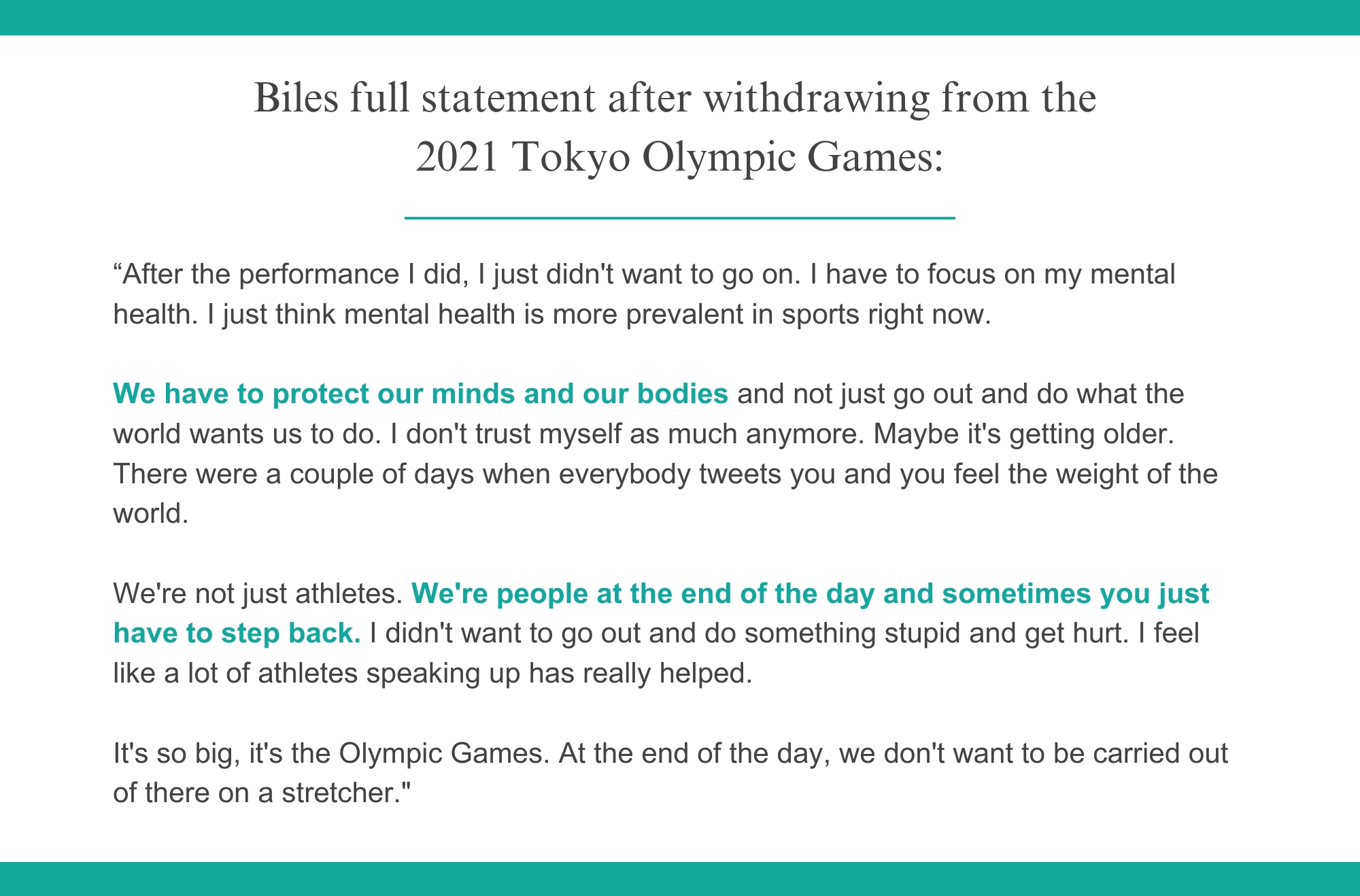
These Olympic champions offer valuable lessons for athletes and individuals alike. As mortgage executives, all of the above applies and matters. A passion for what we do, maintaining a keen focus on our strategy and objectives, believing in ourselves and our company, getting into “the zone” and staying there regardless of market fluctuation, fine-tuning the fundamentals of our business, and, above all, prioritizing our own mental and physical health and that of our people is a winning combination for companies to thrive long-term.
To Spark Creativity. Even short respites can significantly boost creativity. During my time at Mortgage Cadence, our CEO often took a couple of his senior executives for walks around downtown Denver. These casual strolls, which were essentially brainstorming sessions, allowed us to discuss sales challenges, product roadmap ideas, staffing, and other pressing matters in a more relaxed setting. This freedom fostered a more creative flow of ideas. Plus, it was good exercise. Steve Jobs was a tremendous advocate of walking meetings. On a larger scale, taking time away from the office provides an opportunity for big or innovative ideas to emerge.
To Promote Productivity. An Ernst & Young study found that executives who rested and slept during their vacations returned to work with improved clarity, focus and productivity. The study showed that for every additional 10 hours of vacation time taken, year-end performance improved 8%. Another study showed that using all of the allocated vacation time has been shown to enhance employee productivity and increase the likelihood of promotions or raises. Everybody wins.
To Improve Health. Work pressures, especially in this current economic environment, can elevate levels of stress hormones like cortisol and epinephrine, similar to the body’s response to physical danger. An increase in stress hormones can suppress the immune system, leading to a “flight or fight” response. Relaxing on vacation can reduce these stress levels, allowing our immune systems to recover and creating a healthier work environment for all.
To Nurture Positive Relationships. Workaholism can negatively impact relationships, but it’s a treatable condition. According to “Shine” authors Gino Wickman and Rob Dube, awareness is the first step. Many work-focused executives experience discomfort during the initial days of extended vacations, a phenomenon known as the “detox” period. Once this feeling subsides, it’s easier to appreciate the sights and sensations of our surroundings and free the mind from work-related stress and anxiety. This is a vital step in fostering healthy relationships.
The consequences of workaholism and burnout are steep: A 2020 study from Deloitte estimates that employers lose approximately $56 billion a year in expenses that stem from burnout — including absence, employees underperforming or functioning at reduced capacity, and turnover costs. And that barely begins to scratch the surface.
Every year more than half of employed Americans give up paid time off (PTO). In 2018, this amounted to 768 million days of unused vacation time, with more than 30% of it forfeited completely, according to the U.S. Travel Association. Adding to this, over 50% of managers feel burned out, meaning taking vacation (and actually unplugging) has never been more important. The U.S. offers its workers far less PTO time compared to other countries, and Americans take even less than what’s offered, averaging just 11 days off per year. This is why we are referred to as the “burnout nation.”
European countries have a minimum of 20 days of PTO paid annually, with France offering the most, at 31 days. The United Kingdom is right behind them at 28 days of paid leave. That’s more than double the average of days taken by Americans.
Leaders should be aware that their actions and words set the tone for our employees’ behavior. If leaders go on vacation and are constantly sending emails or joining in on work calls, employees will feel pressured to do the same. Similarly, if leaders boast that they “never take sick time”, employees may feel obligated to work while they are ill.
Expecting employees to have “unlimited capacity” can foster a “work around the clock” culture of overwork, which is counterproductive and detrimental for the company, employees and clients. Burn-out is real and can have negative consequences.
Americans need to learn to prioritize mental and physical health and wellness, as Simone Biles demonstrated. And this starts with leadership setting a positive example.
According to the MBA’s Quarterly Performance report, Independent Mortgage Bankers (IMBs) have experienced production losses for eight straight quarters. It’s the nature of Americans to want to work harder, put in more hours and demand more of their employees to right the ship. But is this helping or creating more challenges for companies?
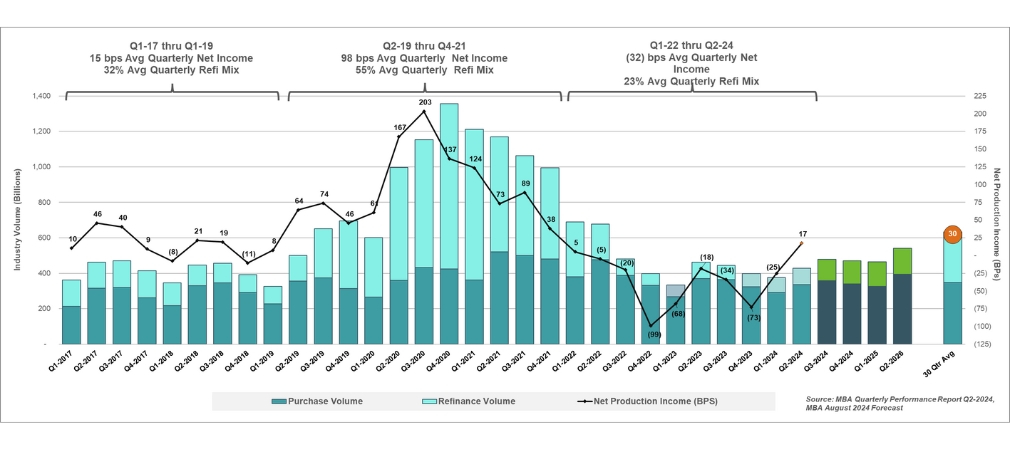
Let’s discuss why we, as an industry, need to get better at focusing on our mental and physical well-being and how doing so can help us weather the current market challenges and thrive well into the future.
Forbes published a great article on this very topic a few years back, “How Leaders Can Vacation Like A Boss And Unplug From The Workplace.” We can all learn from one of the most important points made in the article: Shut off from the work world!
It’s easy to say, “I’m just going to respond to this one email,” but we all know that mentality quickly snowballs into a morning’s worth of time that should have been spent unwinding. When on PTO, it’s important to NOT look at emails. If possible, Forbes recommends hiding your inbox from yourself. Reading and responding to emails, texts, instant messages and taking phone calls is NOT unplugging.
If you decide to talk about work, stay future-focused — much like my Mortgage Cadence example. Use this time to dream, be creative, strategize and brainstorm versus obsessing over present problems.
Denver Nguyen, Chief People Advisor at Wayfynder, is a dedicated “vacationer”. He takes two weeks off with a complete disconnect from work. He believes it sparks creativity and compares this experience to a two-week meditation session which thereby provides him clarity to change and communicate his vision for the company. Wayfynder believes their business is only as strong as its people.
STRATMOR’s Mergers & Acquisitions (M&A) team has made some great observations while working with our seller clients: To see how ready a company is to operate without its key executives, ask those senior leaders to take sixty to ninety days to totally disengage and see how the company manages without them. It’s a great test of future sustainability under new leadership.
Summer is wrapping up and many of you (hopefully) are taking some well-deserved time off. We wanted to share a few examples of how we can relax and unwind.
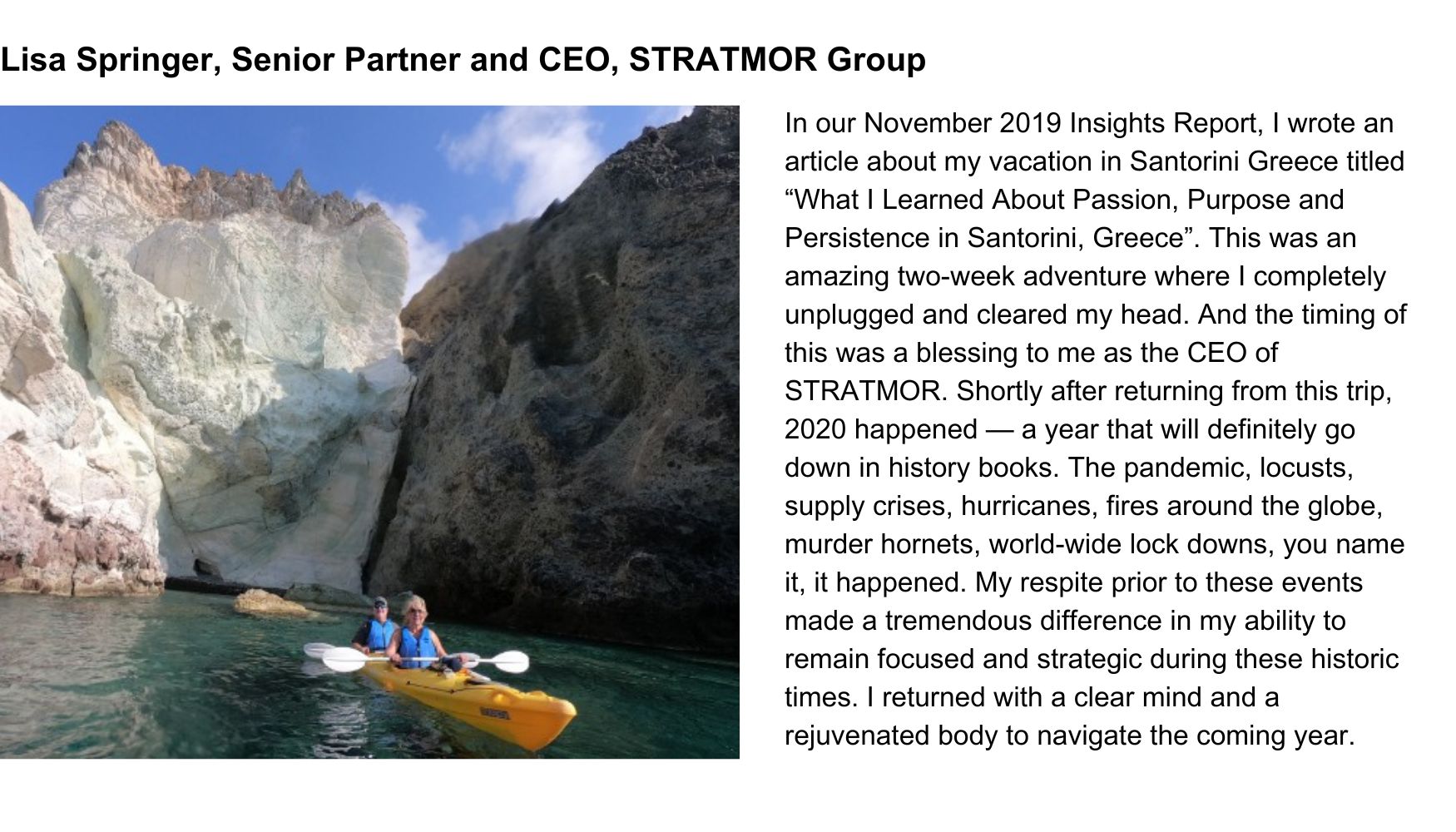
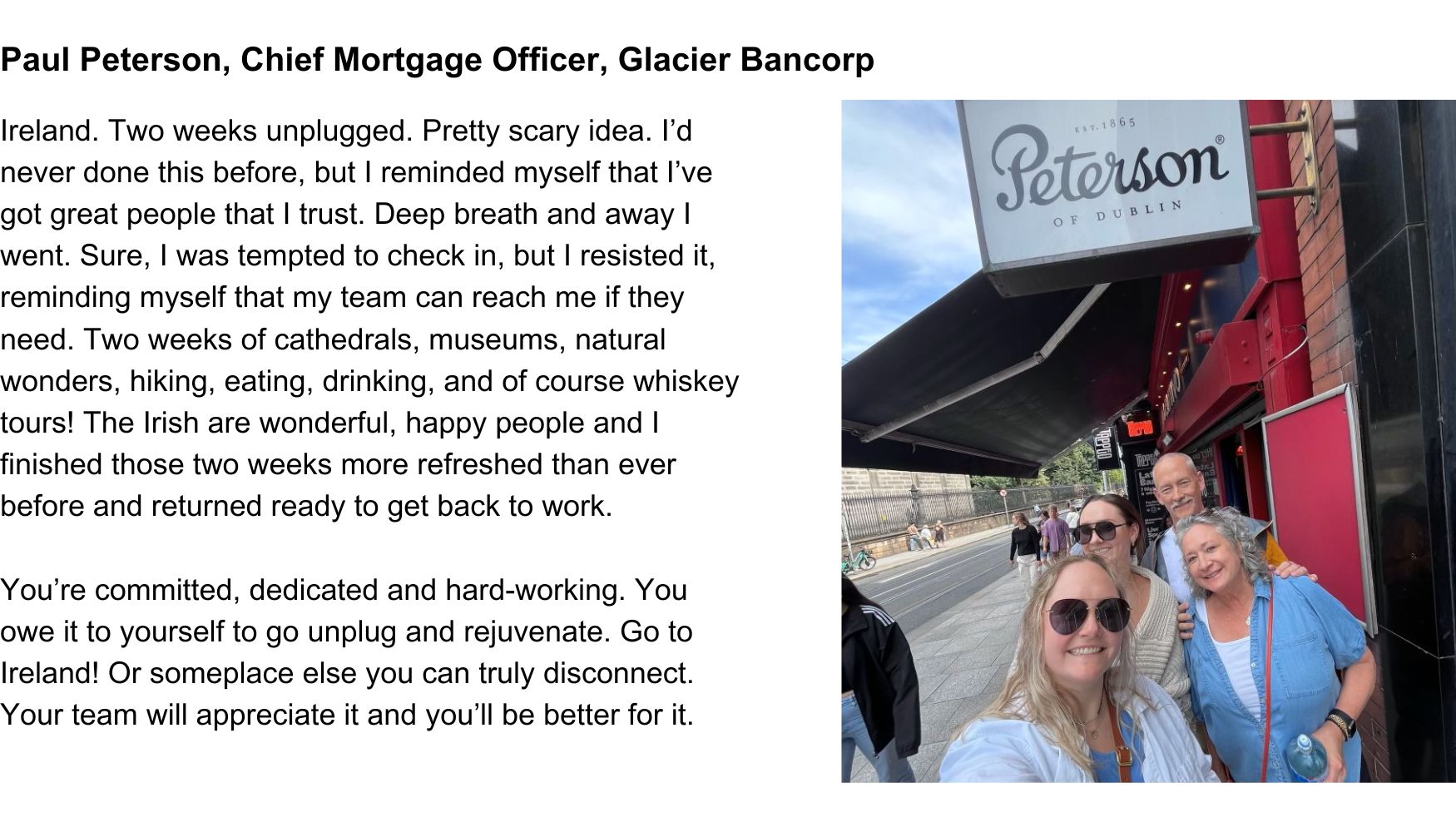
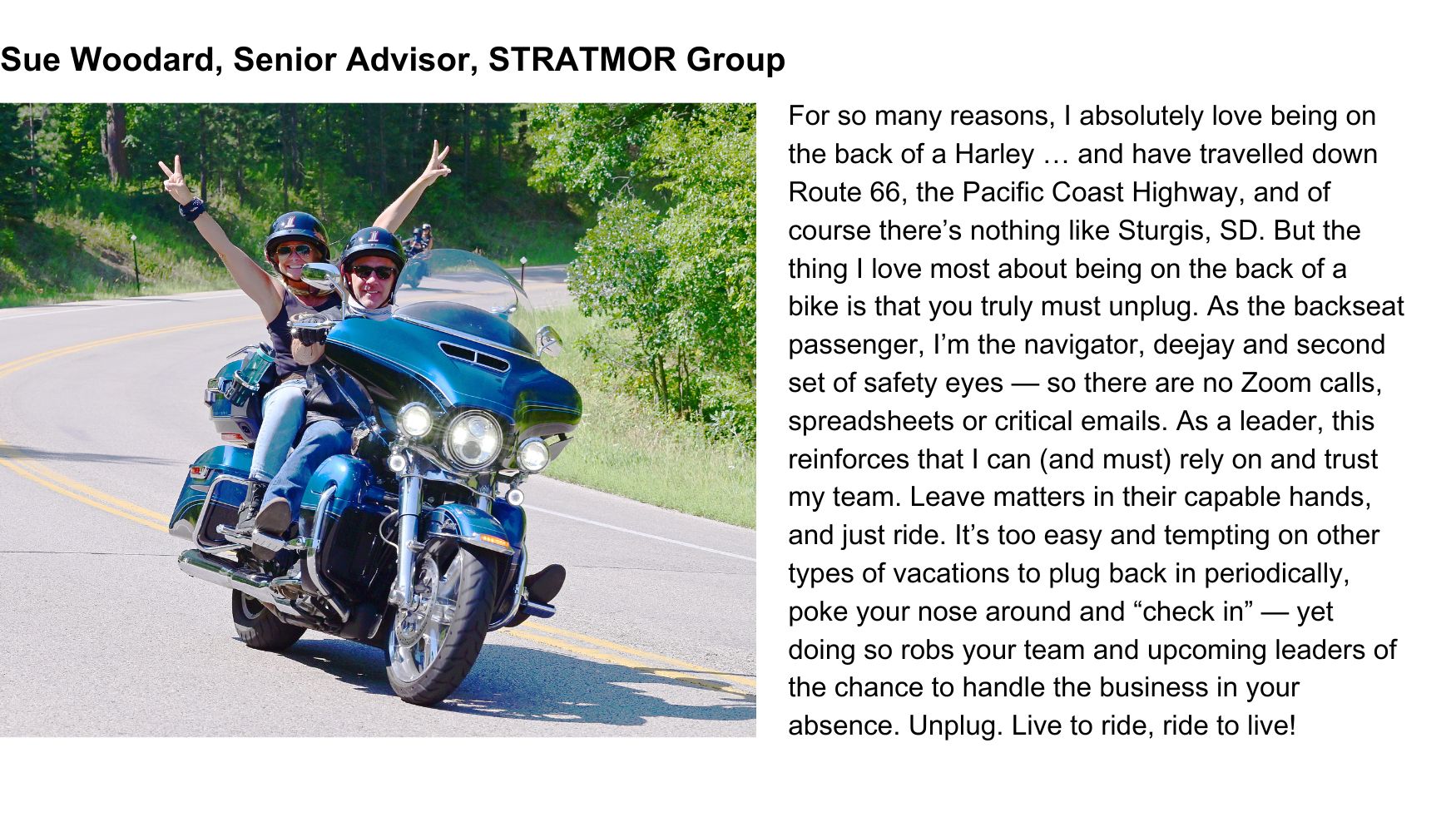
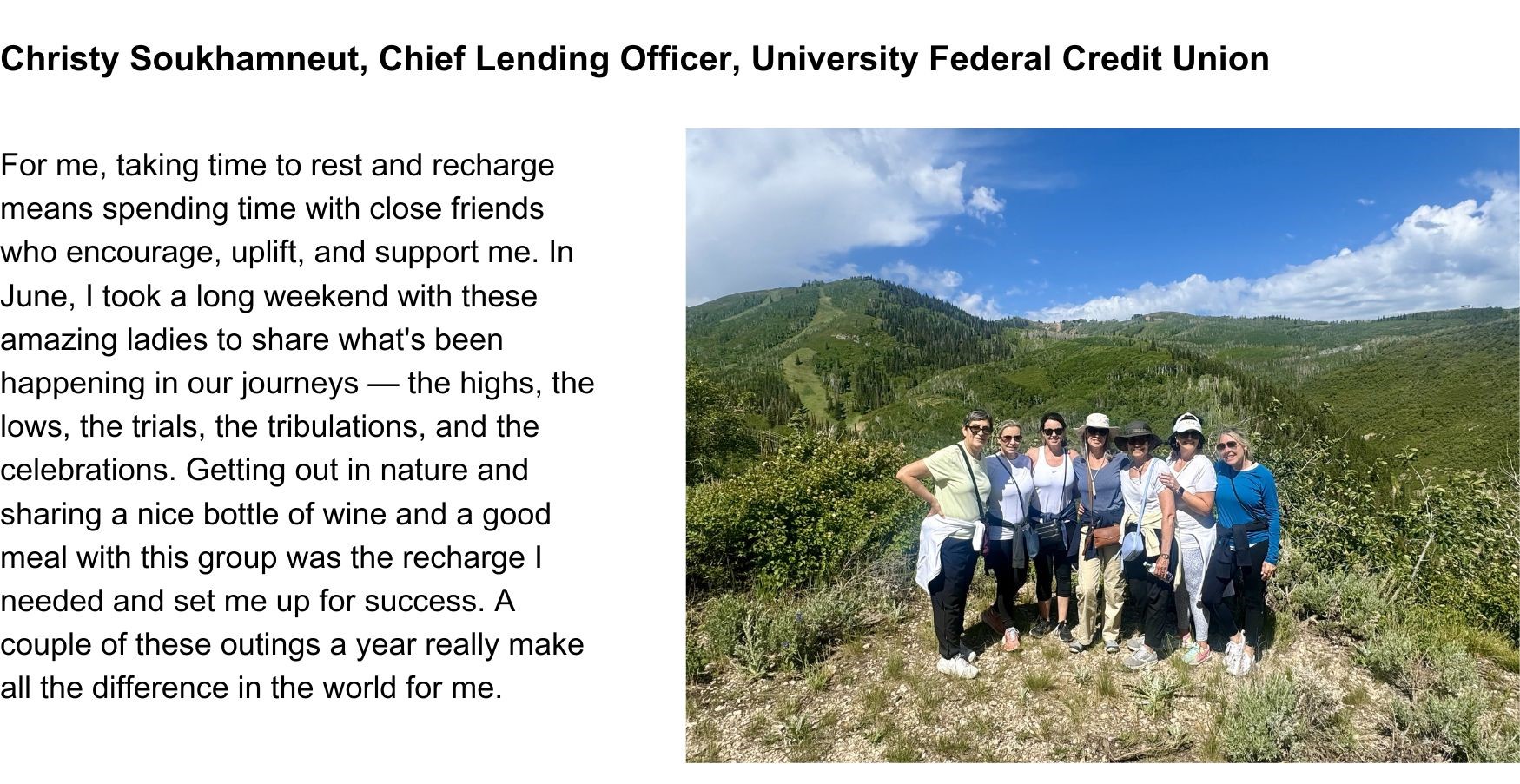
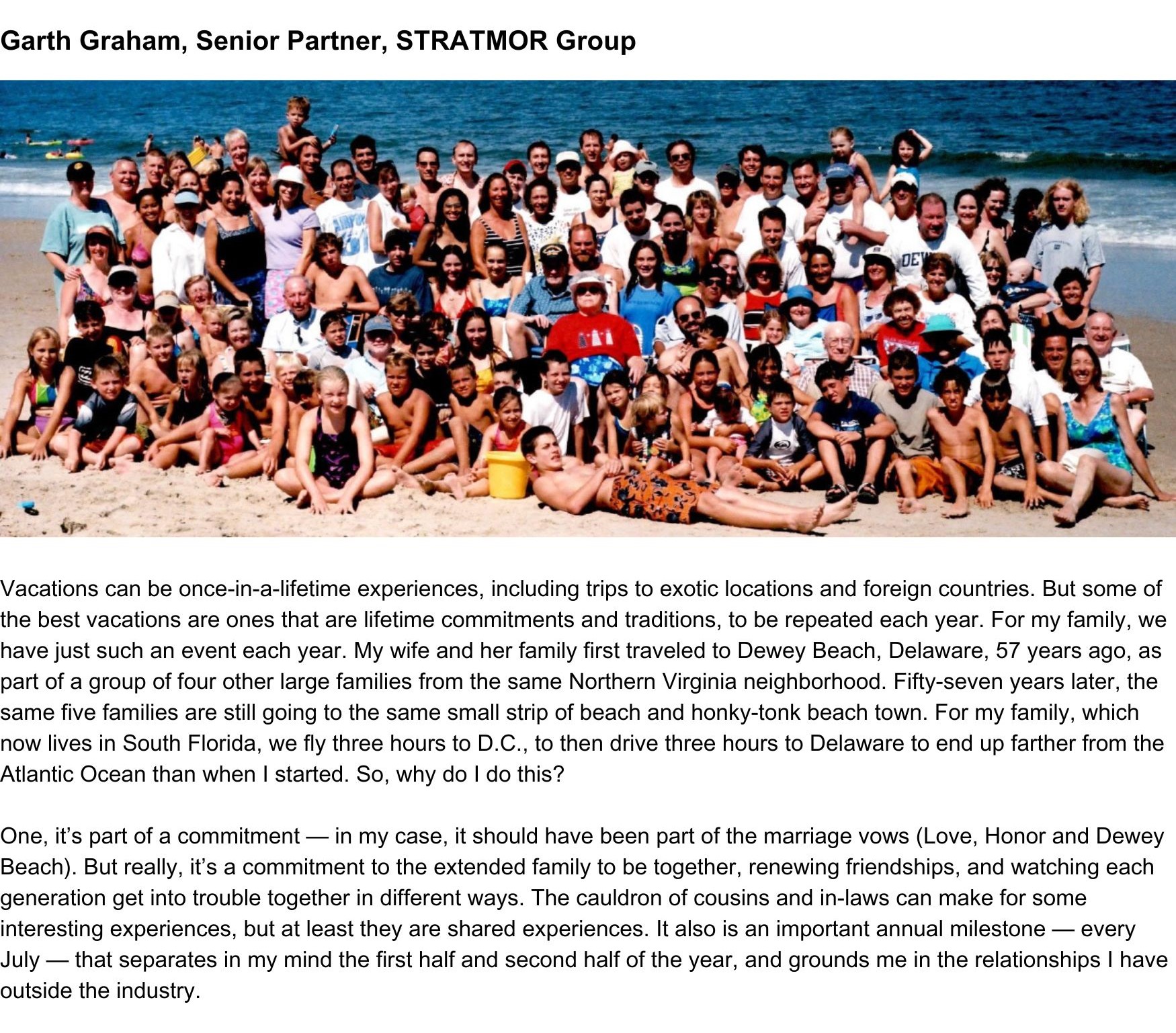
Let’s take our lead from the 2024 Olympic athletes and apply the concepts described earlier in this article:
Passion: The driving force behind loyalty, teamwork, and success. It’s our “Why.”
Focus: Determines the level of success we can achieve. When focus aligns with a strategic action plan, the results are profound.
Belief: Visualize success to achieve it.
Zone: Peak performance and heightened concentration.
Fundamentals: Mentor and share essential knowledge for team success.
Health: Prioritize well-being for sustained performance, as demonstrated by Simone Biles.
Taking time off is not merely a luxury; it is a strategic investment in our personal and professional well-being. Just as Olympic athletes prioritize rest and recovery to maintain peak performance, we as mortgage professionals must do the same. By embracing the power of time off, we can foster creativity, enhance productivity, improve health and nurture positive relationships.
Although summer is the most popular time to take a well-deserved break, vacations can happen any time of the year. Companies offer paid time off as a valuable perk, recognizing its benefits for individuals, organizations and clients. So, don’t hesitate to prioritize your mental and physical health. Take a vacation, recharge and return to work refreshed and ready to tackle any challenges with renewed vigor! Lisa Springer
STRATMOR works with bank-owned, independent and credit union mortgage lenders, and their industry vendors, on strategies to solve complex challenges, streamline operations, improve profitability and accelerate growth. To discuss your mortgage business needs, please Contact Us.





